How can we age in a healthier and more socially active way? How can we anticipate, prevent, and treat infectious diseases? How can technology improve healthcare? And how can we ensure the sustainability and safety of food? These were some of the main subjects explored during the symposium “The Bioengineering – One Health Alliance in 2050: A One-Day Voyage into the Future”, which sought to address how bioengineering can address societal challenges.
INESC TEC joined ICBAS – School of Health and Life Sciences of the University of Porto, the Institute for Research and Innovation in Health (i3S) and the Center for Neuroscience and Cell Biology of the University of Coimbra (CIBB) in the joint organisation of the event, dedicated to promoting the debate on the future.
With eyes set on 2050, the predictions of various organisations focused on different topics like demographic trends, the impact of ageing on health, infectious diseases, food availability and quality, or digital technologies. Bearing in mind that these issues cover different society sectors and considering bioengineering as a cross-cutting area that can connect various scientific fields, the symposium brought together a group of 50 experts, representing various quarters of society, to picture the future, while looking at the past and the present, and fostering a broad discussion on the subject.
How can we age in a healthier and more socially active way?
One of the panels of the event, featuring Teresa Rodrigues (NOVA University), Jennifer Elisseeff (Johns Hopkin University), Tiago Outeiro (Göttingen University Medical Center) and Bruno Jesus (iBiMED) – with Lino Ferreira (Universidade de Coimbra) as chair – focused on demography, regenerative immunology, aging, neurodegenerative diseases, and reversal of the aging process.
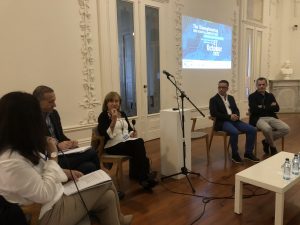
Teresa Firmino (Público newspaper) moderated the panel, with the participants discussing demographic changes – particularly those occurring in developed countries, like Portugal, where there is an aging population, because of a decrease in the younger population and a general increase in average life expectancy. Longer life cycles influence healthcare systems and pose challenges to contributory systems, entailing the establishment of the necessary conditions for people to live more actively and autonomously; these aspects lead to a debate on the need to review the age/work balance or the prevalence of age-related diseases.
Moreover, and concerning aging societies, the members of the panel recalled that neurodegenerative diseases, e.g., Alzheimer’s and Parkinson’s, have been increasing their prevalence, with predictions indicating an increase in the number of people diagnosed with said diseases. In this sense, technology can play an important role – for example, with smartphones or smartwatches – not only supporting symptom monitoring, but also providing information and increasing knowledge about neurological diseases.
In an attempt to ensure that people can age with quality, efforts in the field of bioengineering are also important, namely the work that has been developed in the area of tissue regeneration and growth – through the use of biomaterials, leading to a series of outlooks on the future use of similar approaches to “modulate the immune system”, in order to improve tissue regeneration – and some studies using mouse telomeres, which have shown promising results in the recovery of regenerative capacity among older animals.
How can we anticipate, prevent, and treat infectious diseases?
The lessons we learned from the COVID-19 pandemic and how this knowledge can shape a response to a future pandemic scenario were the main themes discussed by Rogério Gaspar (World Health Organization), Maria João Amorim (Gulbenkian Science Institute) and Raquel Duarte (ICBAS). Moderated by António Granado (NOVA University), the panel – with Fabíola Costa (SWORD Health) as chair – discussed how infectious diseases can be anticipated, prevented, and treated, considering the COVID-19, which showed a new way to act in the face of pandemic outbreaks: the ability to mobilise society, in a joint effort to tackle the disease.
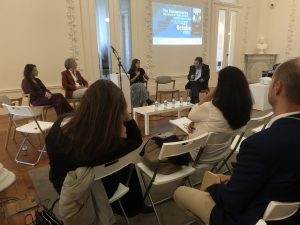
With a view to fight against the pandemic, the World Health Organization brought together more than 70 countries and 100 government entities, while managing more than 500 regulatory processes. Despite the inequalities observed worldwide, not only in the management of the pandemic, but also in access to vaccines, this response led to a set of lessons that may be useful in future pandemic contexts, especially considering surveillance and planning, dynamics of virus transmission, diagnosis and treatment, public behaviours and attitudes or main barriers and challenges to outbreak prevention.
In this sense, “prevention”, “detection” and “cure” are the three keywords for a future reaction, and there seems to be consensus on the occurrence of a new pandemic. In addition, this panel discussed the strong probability of a new outbreak coming from animals, without forgetting the impact of climate change and its consequences on the outbreak and proliferation of diseases. An example is the impact of floods in countries like Pakistan, where there has been an increase in the number of mosquitoes and, consequently, in the number of diseases transmitted by said insects.
Coordination between organisations – public, private, and so ial – also seems to be a key aspect in defining common strategies and addressing inequalities between countries. The panel members also emphasised communication and information as crucial aspects, reinforcing the importance of investing in literacy and remembering that Portugal was one of the few countries to provide daily information on the evolution of COVID to the population.
How can technology improve healthcare?
The pandemic reinforced the importance of aspects like the access to universal healthcare, the contribution of data sharing to the improvement of public policies and the potential of health digitalisation. Harro van Lente (University of Maastricht), Ana Sofia Carvalho (ICBAS), Fernando Correia (SWORD Health) and Carme Carrion Ribas (Open University of Catalonia) were the participants of this panel, moderated by Vanessa Ribeiro Rodrigues (Observador newspaper), with Daniel Vasconcelos (INESC TEC) as chair. The members focused on debating the potential of digital health (already considered a new paradigm) and the main barriers/challenges to its implementation.
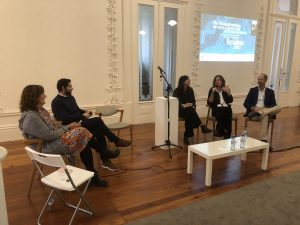
According to the experts, digital health allows a more person-centred approach, by shifting the focus of the disease to the patients, placing patients at the centre of the process, and understanding technology as a means to improve well-being. If, on the one hand, this approach requires the development of skills that improve and facilitate the doctors – users relationships, on the other hand, a future supported by technologies, with healthcare provided at a distance, can lead to a decrease in human contact.
However, aspects like the contribution of Artificial Intelligence to personalised medicine, by allowing the processing and analysis of significant amounts of data (estimated to be even greater by 2050) seem certain. In this context, and considering the digitalisation of healthcare, data plays a vital role: not only in enabling personalised care, but in advancing the emergence of new therapies and predictive medicine, facilitating decision-making.
In addition to obstacles like the heterogeneity of healthcare systems or the costs associated with technology, digital health also faces a series of challenges i.e., from an ethical point of view, digital literacy and equal access to technological solutions – even in Internet access, for instance -, which may increase inequalities between countries. With this in mind, the panel emphasised the importance of transparency and information, as well as literacy and digital skills, as reducing inequalities will be vital to the promotion of digital health.
How can we ensure the sustainability and safety of food?
The panel featuring Tiago Santos Pereira (University of Coimbra), João Pedro Conde (INESC MN), Joana Silva (Catholic University) and Luísa Valente (CIIMAR and ICBAS), moderated by Andreia Azevedo Soares (Public newspaper) and with Eduardo Silva (University of California) as chair, focused on how bioengineering developments can contribute to increase the quality of food and ensure the protection of plants and animals against potential diseases, thus promoting the safety of agricultural processes and the emergence of alternative food sources.
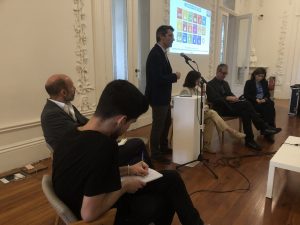
Among the main conclusions is the need to analyse the increase in inequalities and poverty worldwide, which poses major challenges in accessing food. From a technological point of view, there have been advances with a clear impact on nutrition, consumption, and food production, which have led to changes in eating patterns. Still, there is a clear need to look for alternative, sustainable, and responsible sources, especially at a time when protein consumption increases significantly. In this context, the importance of technology is acknowledged not only to make production processes more efficient, but also to increase the bioavailability of nutrients, as well as food safety.
Still on this topic, the panel presented different technology solutions e.g., biosensors that help producers to understand if they’re overwatering their crops, for instance. The panel also discussed questions about the urgency of reducing food waste, consuming less and with better quality, the need to clarify legal aspects and the relationship of people with food – which may affect the consumption and acceptance of food alternatives.
The symposium “The Bioengineering – One Health Alliance in 2050: A One-Day Voyage into the Future” took place at the Galeria da Biodiversidade – Natural History and Science Museum of the University of Porto (MHNC-UP), in late October. The conclusions of the symposium will act as foundations for a White Paper, to share the results of the different debates among broader audiences, thus promoting their involvement in said themes. Representing INESC TEC, the organisation of this Symposium featured Daniel Vasconcelos, head of the Technology Licensing Office (SAL) – one of the five mentors of this idea, along with Mário Barbosa – and the chairs Joana Coelho, head of INESC TEC’s Communication Service (SCOM) and Pedro Fonseca, designer at SCOM.

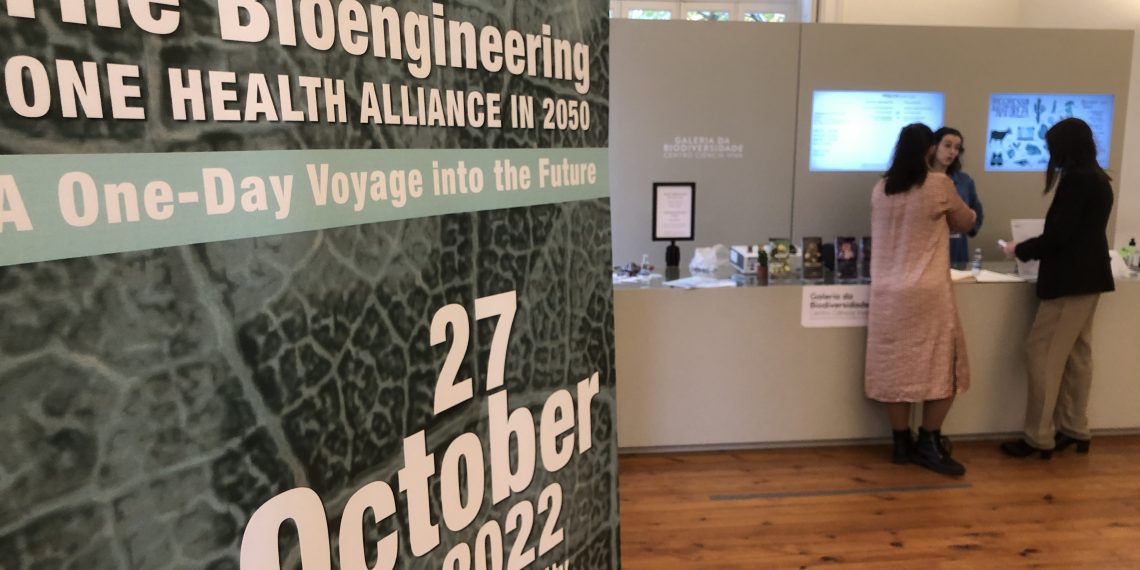

 News, current topics, curiosities and so much more about INESC TEC and its community!
News, current topics, curiosities and so much more about INESC TEC and its community!